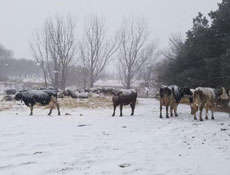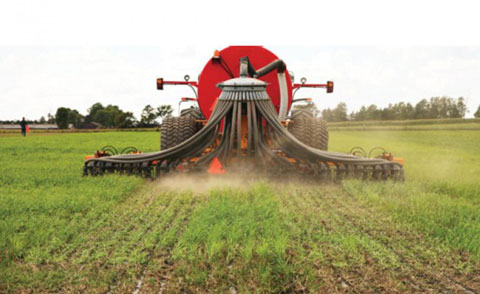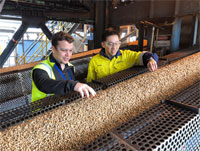



Climate, food and national security at a crossroads
In this podcast, ffinlo Costain interviews Caitlin Werrell, co-founder of the Centre for Climate and Security and Rear Admiral Neil Morisetti, the UK's former Climate, Energy and Security Envoy, to explore the relationship between climate change, the global food system and national security.Numerous UN reports and political commentaries have theorised that climate change will negatively impact food availability – putting vulnerable countries at risk of food shortages and political instability. However, the analysis often overlooks the ways wealthy and developed countries could be impacted by a warming climate. According to leading experts Caitlin Werrell, co-founder of the Centre for Climate and Security and Rear Admiral Neil Morisetti, high-income countries and established democracies may not be as insulated from the effects of climate change as previously thought.

Society is nine meals away from anarchy
According to Werrell’s analysis, the food supply of the developed world may be more vulnerable to climate change than we realise. Wealthy countries like the United Kingdom and United States are only a few steps away from significant supply chain vulnerabilities and weaknesses if their food infrastructure is eroded by climate change.
Developed countries tend to rely on food imports for staple goods. They are also integrated in complex supply chains with countries that are highly susceptible to climate impacts. Food demand from wealthy western consumers is high and constant, and reliance on just-in-time logistics means that food supplies can be knocked off course in extreme weather events.
She also states that global warming will emphasise existing inequalities in developed nations and could exacerbate latent civil unrest.
If we continue our existing greenhouse gas emissions and warming trajectories, developed countries could face severe disruptions to food and water supplies by 2060. Werrell believes that making our food infrastructure more resilient is of paramount importance – and that we need to start developing contingency plans.
Morisetti echoes much of Werrell’s analysis, telling Costain that fears of an uncertain future are valid. The global population is still growing, and as countries get wealthier, increased consumption patterns will strain the world’s finite resources. The fact that some corners of the world live in abundance while others live in poverty will cause tension as well.
In his experience, food – or the lack of it – is often at the centre of social breakdown. He quips that, “society is nine meals and two days of water away from tensions and instabilities.”
The military perspective
Though Morisetti doesn’t believe that climate change is a direct cause of conflict, he states that it’s a threat multiplier. He likens the social and agricultural instability of global warming to putting petrol on an already smouldering fire – it’s an accelerant.

He cites the Arab Spring of 2011 as an example of this. After poor wheat harvests in Russia, Canada and Australia due to extreme weather events, Tunisia couldn’t provide enough bread to its citizens. The ensuing bread riots and political malaise contributed to the fall of then-dictator Ben Ali.
Syria’s upheaval in 2011 was influenced by climate change as well. A long drought and multiple failed harvests led to a demographic shift within Syria. Rural populations moved to urban centres, stressing the state’s infrastructure. The new social fabric of Syria’s cities accelerated religious and political tensions, leading to protests.
Throughout Morisetti’s career, military organisations have been among the first groups to respond to weather-related emergencies and provide resources to people facing food and water insecurity. They have also been called to address social unrest that emerges from sustained shortages and disasters. Though this has been effective so far, he stresses that this armies may not be able to provide this relief as the climate crises worsens.
Current analysis
In Werrell’s capacity as co-founder of the Centre for Climate and Security, she launched the first World Climate and Security report. The report consists of survey data from key stakeholders and experts. It also includes regional and global coverage of our climate-related vulnerabilities and analysis from both military and civilian leaders.
The report’s survey data indicates that 93 percent of respondents feel that weather insecurity was becoming more prevalent – and that it would play a greater role in general global instability by 2030. The focus on weather insecurity relates to its impact on water infrastructure and distribution.
Since agriculture is dependent on water at every stage of operation, any variations in water availability due to extreme weather events will put food security at risk. The contributing experts concluded that these vulnerabilities could scale up to higher order risks, with conflict being more likely if they are sustained.
Werrell found that more militaries are sounding the alarm on climate change. Similar to Morisetti’s observations, the report states that climate change it is impacting military assignments and their ability to successfully resolve conflicts. Military experts outlined the need for diplomatic and civilian input in managing potential crises and the accompanying security risks.
Executive and government leadership is needed as the developed world faces these challenges. Though many will cite climate change denial in the national leadership of countries like Australia and the US, Werrell found that intelligence agencies include climate change in annual threat assessments – regardless of the political implications. Building public support for climate-proofing measures will be a significant but critical achievement.
What we can do
According to Werrell, wealthy nations need to identify the ways climate change leaves them vulnerable and start planning ways to diminish risks. This includes doing supply chain audits so policymakers can identify the routes goods take before reaching the market. This doesn’t necessarily mean that developed countries should become self-sufficient and stop importing food – it simply means accounting for existing weaknesses and developing contingency plans.

Werrell and Morisetti agree that the worst climate impacts can be avoided if we quickly reduce carbon emissions. They also stress the need for knowledge sharing between countries. All of this will require a change in mindset. The individual decisions we make impact people thousands of miles away – something the global food system obscures.
In terms of official responses, Werrell and Morisetti agree that developed nations need to come up with near-term and long-term plans to address food security. When speaking to Costain, Morisetti emphasised that governments should engage the public and make the case for investing and futureproofing. It’s also important to expand contingency plans beyond the national level – hurricanes and forest fires don’t respect state lines.
On the precipice
During her interview, Werrell emphasised that the developed world finds itself at a critical moment. If countries don’t seize the opportunity to prepare and climate-proof our food infrastructure, we will face a future of hard choices with no good options.
Morisetti also felt that agriculture and the global food system has entered uncharted territory. He explained that though food supplies have always fluctuated, today’s production margins have slimmed, and demand continues to skyrocket. Agriculture hasn’t adapted to a climate crisis future.
Climate change will force developed nations to reconsider the way they view weather-related risks. To illustrate this point, Werrell tells Costain that while wealthy countries can withstand one hurricane or major flood, their ability to withstand multiple disasters in quick succession is less certain. She also stresses that if weather-related catastrophes impact multiple production centres at once (floods in grain producing areas like the Mississippi Valley of the US or bushfires in Australia, for example), our ability to source food will be undermined.
In her view, the developed world isn’t immune from authoritarian responses when it comes to climate-related challenges. Morisetti agrees – highlighting that military organisations are often tasked with responding to escalating social tensions in the aftermath of food insecurity. He doesn’t believe that this management strategy is viable long-term. At some point, military organisations won’t be able to address these issues.
Though their analysis doesn’t make for an uplifting story, Werrell and Morisetti did end their interviews on a hopeful note. The developed world still has an opportunity to mitigate the worst effects of climate change, and technological innovation can make the agriculture sector more resilient. Acting now will allow us to develop practices and policies that alleviate climate risks. It will also let us avoid breakdowns in governance and respond to issues in a humanitarian way.
Listen to the full Farm Gate podcast here.


